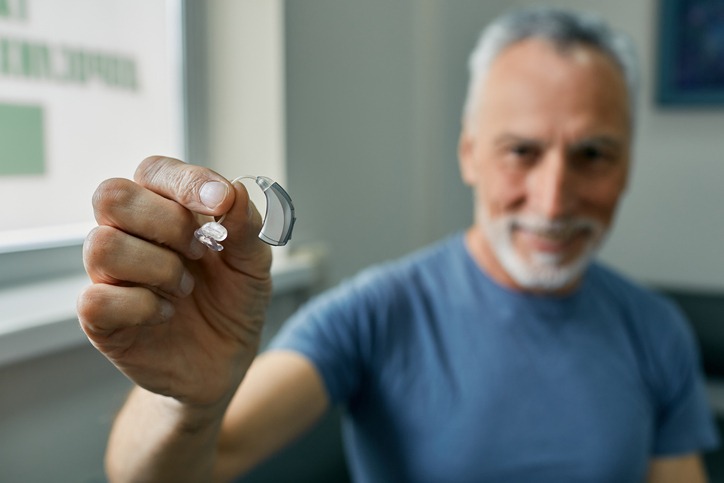Age related hearing loss, aka presbycusis, is one of the most common sensory ailments that affect the elderly. However, does that mean age itself is the cause responsible for hearing loss in older people? Are there other factors that play a role in exacerbating hearing loss? Is there a viable treatment for presbycusis? Let’s try and answer those questions and many more.
Age is Indeed the Primary Cause for Presbycusis
Studies and tests have confirmed that aging itself is the primary cause for hearing loss in elders. Most seniors over the age of 70 have hearing loss in varying degrees of severity. There are also secondary factors such as poor lifestyle choices, harmful sonic exposure, diabetes, hypertension, etc., that further contribute towards age related hearing loss.
Consequently, elders become even more susceptible to presbycusis if one or more of the contributing factors are present. They may start to lose their hearing at a comparative earlier age and at a faster rate. Similarly, positive lifestyle choices, genetic factors, and proper presbycusis management can delay the onset of age-related hearing loss or at least, helps in slowing down the degeneration.
After a certain age, passage of time tends to take a negative toll on the entire human body. Our hearing is, unfortunately, one of the first senses to be affected by the phenomenon. It has been found that gradual degeneration of the inner ear is the most common reason for age related hearing loss, and it may occur even without traumatic external factors.
External Factors that Increase the Potential Risk and Degree of Age-Related Hearing Loss
Old age also makes us more vulnerable to diseases and conditions which may directly or indirectly worsen the condition. The following include some of the known comorbidity factors for age related hearing loss.
- Hypertension (High blood pressure).
- Type II diabetes.
- Exposure to acute and regular high intensity noise emitted by loud headphones, speakers, power drills, power saws, lawn mowers, airplane engines, loud machinery, gun shots, etc.
- Accidental or incidental physical trauma to the ear.
- Repetitive occupational trauma to the ears (boxing, wrestling, football, rugby, etc.).
- Long term pressure damage, often caused by wearing headsets for long hours regularly.
- Cerebral strokes that affect the superior temporal gyrus, which is the part of the human brain that controls hearing.
- Otitis media, which refers to viral/bacterial infections of the middle ear.
- Side effect from certain meds, especially those used in treating cancers (chemotherapy drugs).
When one or more external factors are there, the ensuing hearing loss is always experienced by seniors with more intensity than it is observed in any other age group. This is to be expected because:
- The longer we live, the more damaging sonic exposures we are likely to experience.
- Natural degradation of the inner ear structures makes all external factors even more damaging.
- Elder populations have the highest percentage of diabetics with high blood pressure and stroke victims.
- Aged adults find it increasingly difficult to prevent or get rid of ear infections due to weakened immune systems.
How to Prevent Age-related Hearing Loss?
It is possible to delay the onset and the progress of age-related hearing loss by keeping your ears protected against damaging noise of any kind. Ear structure degradation caused by the passage of time will still occur though, but the effects are not likely to be as severe in most cases if you:
- Avoid listening to music or media of any other kind at high volume, especially for extended periods of time.
- Use earmuffs at work if the job involves being constantly exposed to loud noises.
- Use appropriate ear protection, if there is a chance to receive traumatic ear injury (combat sports and sports in general).
- Practice a healthy lifestyle that reduces your chance of developing age-related health conditions later.
These are all fine tips, but they are most effective when you are still relatively young. Unfortunately for people in older generations, they may have already made many of the mistakes unwittingly that they should not have.
Therefore, if you or someone close to you is suffering from age-related hearing loss, a quick diagnosis of the actual problem and prompt treatment is extremely important. Find a hearing care specialist nearest to your location at www.phonak.com/en-us/find-a-provider for professional assistance. They will be able to:
- Confirm whether you really do have age-related hearing loss or hearing loss of any kind.
- Determine how much of your hearing you have lost, if any.
- Help you find the best solution to treat the problem and augment your hearing with customized aids.
Most of the time, people are unable to tell when they start losing their ability to hear. Age-related hearing loss is a gradual degeneration that does not happen overnight. It is not ideal for anyone to wait until their hearing loss becomes bad enough for them to realize it with undeniable clarity. If you find others complaining that you have a hearing problem, it’s best to get your ears checked as soon as possible.

